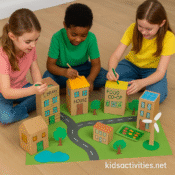
Philosophy for Children – A Gentle Introduction to Socratic Discussion
The Challenge
Children are naturally curious, but when it comes to abstract thinking, many adults wonder: “Is my child ready for philosophical conversations?” The fear of making it too complex or too boring often stops parents and educators from trying.
What’s the Opportunity?
Philosophy for children isn’t about quoting Plato — it’s about nurturing curiosity, critical thinking, and open-mindedness through meaningful questions. Using the Socratic method — asking rather than telling — kids learn to think more deeply and express their ideas respectfully.
Start Here: Understanding the Socratic Method for Kids
The Socratic method is a form of cooperative dialogue where participants ask and answer questions to stimulate critical thinking. For children, it becomes a playful but powerful way to explore ideas like fairness, bravery, happiness, and truth.
Key Principles:
- There are no wrong answers
- Questions are more important than answers
- Listening matters as much as speaking
- It’s okay to change your mind
Conversation Starters for Different Ages
Ages 5–7: Start with Storytime
Use familiar stories and ask simple, open-ended questions.
Examples:
- “Was the Big Bad Wolf really bad? Why or why not?”
- “What makes someone a good friend?”
- “If you could switch places with a character, who would it be and why?”
Ages 8–10: Introduce Real-World Concepts
Children can begin to grapple with ethical or societal questions.
Examples:
- “Is it ever okay to break a rule?”
- “What does it mean to be brave?”
- “Why do people disagree, and is that a bad thing?”
Ages 11–13: Encourage Self-Reflection and Debate
Pre-teens enjoy taking a stance and defending their views — harness that!
Examples:
- “Is happiness more important than success?”
- “Should everyone be treated the same? What if they act differently?”
- “Is it fair that some people have more than others?”
How to Host a Mini Socratic Circle at Home or in Class
Step 1: Choose a Stimulus
- A picture book, short video, quote, or everyday event.
Step 2: Set Expectations
- Everyone gets a turn.
- No mocking or interrupting.
- You can pass or change your answer later.
Step 3: Ask the First Question
- Start broad: “What do you think is going on here?”
Step 4: Let Kids Take the Lead
- Use prompts like: “Why do you think that?” or “Can someone build on that idea?”
Step 5: Reflect Together
- What did we learn?
- Did anyone change their mind?
- Were we good listeners?
Printable Tools to Support Your Discussion
- 10 Socratic Prompts for Kids (by age group)
- My First Philosophy Journal (printable template)
- Parent/Teacher Discussion Circle Guide
These tools provide structure without controlling the flow — perfect for first-time facilitators.
Bigger Than a Conversation
Philosophical dialogue builds more than vocabulary — it cultivates empathy, emotional intelligence, and flexible thinking. When children learn to explore multiple perspectives without fear, they become more confident thinkers and kinder humans.
Start small. One question a day. You’ll be amazed where it leads.
Share your child’s favorite “big question” with us at




